People
Investigators
Professor Charles Monroe
Engineering Science, University of Oxford

Charles Monroe is the Principal Investigator of M-RHEX and an Associate Professor and College Tutor of Engineering Science at the University of Oxford. His interest focusses on the development and modelling of electrochemical devices for energy storage and conversion. Charles is primarily interested in batteries and fuel cells, which his research group explores through both theoretical and experimental routes. They are primarily interested in how the performance, degradation, and applicability of energy-storage devices correlate with the fundamental properties of the materials comprising them. The group's projects at the moment involve the theoretical description and experimental characterisation of next-generation batteries for vehicles; the development of cheap, long-lived, high-capacity batteries to accompany wind-power or solar-power delivery systems; and the analysis of heat generation, swelling, and degradation in lithium-ion batteries of various types. Despite their fundamental focus, the Monroe Group try to keep a close eye on the practical applicability of our research. They collaborate with and have been funded by an array of multinational companies, including Robert Bosch LLC, Ford Motor Co, General Electric, DENSO, and Procter & Gamble.
Dr Ainara Aguadero
Materials, Imperial College London

Ainara Aguadero is a Senior Lecturer at the Department of Materials, Imperial College London. She is an expert on the development of ceramic conductors for energy applications (solid oxide fuel cells, electrolysers, and batteries). Specifically, she is focused on understanding the relationship of physical and chemical properties with structural and microstructural features, and through this understanding has developed new materials with substantially increased performance compared to the current state-of-the-art. Ainara has published 62 peer reviewed papers with combined citations of >1.9k (h=24) and she holds 1 patent. She has obtained research funding totalling over £3.3M in addition to different contributions as Co-Investigator in national and international projects. She is Principal Investigator of EPSRC strategic grant (EP/P029914/1) for the development of “High Five” a unique surface analysis facility for in operando chemical analysis from the nm to mm scale and is the Departmental Manager of isotope exchange facilities. She is a Science Board member for the Hydrogen and Fuel Cells Supergen (H2FC), the Superstore Hub, and the Energy Materials Group of IOM3.
Dr Jenny Baker
College of Engineering, Swansea University
Jenny Baker is Senior Research Officer in the College of Engineering at Swansea University. She is the electrochemical storage lead for SPECIFIC (Sustainable Product Engineering Centre for Innovative Functional Industrial Coatings) working on storage solutions for non-mobile applications including flow cells, lithium-ion and sodium-ion batteries. Jenny’s particular research interest is sustainable materials processing for solid-state devices having spent four years researching fully-printed solid-state photovoltaic devices as part of a collaboration with Oxford on the EPSRC cells into modules programme EP/M015254/2. Her PhD (2011) was in the printed graphene catalysts for dye sensitised solar cells within the Welsh Centre for Printing and Coating. Prior to academia she worked in aerospace for 12 years developing processing routes to enable a circular manufacturing route for aerospace-grade titanium and brings this expertise into her research on sustainable manufacturing.
Dr Piers Barnes
Physics, Imperial College London
Piers Barnes is a Lecturer in Experimental Solid-State Physics in the Department of Physics at Imperial College London. His interests lie in charge carrier behaviour in semiconducting materials and devices, particularly in solar cells and systems for energy conversion. Pier’s research group aims to understand and exploit charge transport, kinetic, and energy transfer phenomena to create devices with new material combinations and architectures for application in solar, sensing, and organic-inorganic electronics.
Professor Rohit Bhagat
Institute for Future Transport and Cities, Coventry University
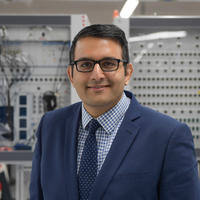
Professor Rohit Bhagat is the chair for Electrochemical Energy Storage at Coventry University. He graduated from Imperial College London in 2008 with a PhD in electrochemistry. He then joined the University of Warwick as a research fellow and subsequently became an Assistant Professor in 2011 where he started the Electrochemical Engineering Group. He was promoted to associate professor in 2015. Rohit's Group has interests in batteries, supercapacitors, and fuel cell research and they collaborate closely with industry.
Professor Nigel Brandon
Earth Science and Engineering, Imperial College London
Nigel Brandon is Dean of the Faculty of Engineering at Imperial College London. His research focuses on electrochemical devises for energy applications, with a particular concentration on fuel cells, electrolysers, and batteries. He is director of the RC Energy Programme funded Hydrogen and Fuel Cells SUPERGEN Hub, and Co-Director of the SUPERGEN Energy Storage Hub. He was the founding Director of the Energy Futures Lab at Imperial, and a founder of Ceres Power, an AIM listed fuel cell company, and RFC Power, a flow battery company. In 2014 he was appointed as founder Director of the Sustainable Gas Institute at Imperial. Nigel was awarded the Royal Academy of Engineering Silver Medal in 2007, the Baker Medal from the Institution of Civil Engineers, as well as receiving an OBE for services to UK-China science for his work in developing collaborations between the UK and China in the areas of climate change, energy, and environment in 2011.
Professor Daniel Brett
Chemical Engineering, University College London
Dan Brett is Professor of Electrochemical Engineering in the Department of Chemical Engineering at University College London. His research is in the area of electrochemical engineering and technology. This includes electrochemical energy conversion and storage (fuel cells, batteries, supercapacitors, electrolysers); electrochemical sensors; electroanalysis, hybrid vehicles, and micro-generation technologies. He specialises in developing novel diagnostic techniques for the study of high and low temperature fuel cells and their materials. He is also active in modelling, instrumentation development, engineering design, device fabrication, materials development, and techno-economic analysis of electrochemical energy conversion technologies.
Professor Peter Bruce
Materials, University of Oxford
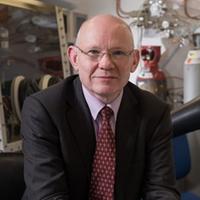
Peter Bruce is Wolfson Professor of Materials in the Department of Materials at the University of Oxford, and Chief Scientist of the Faraday Institution. He is leader of: FI Fast Start project on SSB (FIRG008), SUPERGEN consortium (EP/L019469/1), representing UK energy storage research; a consortium on next-generation Li batteries (EP/M009521/1), and was Head of Department for 6 years. He has led world-renowned Li battery research for more than 25 years. His work has been recognised by 14 major awards from learned societies worldwide, including the Royal Society, the Royal Society of Chemistry, the Electrochemical Society (USA), and the German Chemical Society. He has published 340 papers including in Nature and Science (h=99), and has been invited to give 480 talks, many plenary or keynotes. Peter has worked on Li+ conducting ceramic and polymer electrolytes, anodes, cathodes, and their interfaces. He brings his extensive experience running research consortia, managing academics, and engaging across academia, industry, and government to this project.
Professor James Durrant
Chemistry, Imperial College London

James Durrant is Professor of Photochemistry in the Department of Chemistry, Imperial College London and Sêr Cymru Solar Professor, College of Engineering, University of Swansea. His research addresses the photochemistry of new materials for solar energy conversion – targeting both solar cells (photovoltaics) and solar to fuel (i.e. artificial photosynthesis). It is based around employing transient optical and optoelectronic techniques to address materials function, and thereby elucidate design principles which enable technological development. His group is currently addressing the development and functional characterisation of organic and perovskite solar cells and photoelectrodes for solar fuel generation with funding from the EPSRC, WAG, EC, ESF, and industry. More widely, he founded the UK Solar Fuels Network and leads Imperial’s Centre for Plastic Electronics and the Welsh government funded Sêr Cymru Solar initiative. He has published over 400 research papers and 5 patents, which have been cited over 40,000 times, leading to an h-index of 114. He was elected Fellow of the Royal Society in 2017 and was recently awarded its Hughes Medal.
Professor Feliciano Giustino
Materials, University of Oxford

Feliciano Giustino is Professor of Materials at the University of Oxford. His main research interests are in the development and application of atomistic simulation methods for real materials. Feliciano combines the predictive capability of the quantum theory of real materials with the power of high-performance computing, in order to investigate the structural, electronic, and optical properties of third-generation solar cells and superconductors.
Professor Patrick Grant
Materials, University of Oxford
Patrick Grant is Vesuvius Chair of Materials and Pro-Vice-Chancellor (Research) at the University of Oxford. His research takes place at the interface between advanced materials and manufacturing, and concerns a wide range of structural and functional materials. Current applications include structured porous electrodes for supercapacitors and batteries, 3D printed materials with spatially varying electromagnetic properties for microwave devices, and advanced metallics for power generation. Recent work has also concerned X-ray imaging of microstructural evolution, especially of solidifying alloys. Patrick is a Chartered Engineer (CEng), a Fellow of the Institute of Materials, Minerals and Mining (FIMMM), and was elected a Fellow of the Royal Academy of Engineering in 2010. He was a member of 2008 Research Assessment Exercise panel for Materials and a member of the UK Fusion Advisory Board 2007–12. He wrote evidence paper New and Advanced Materials for the UK Government Office of Science Foresight report Future of Manufacturing (2013) and is a strategic advisor to EPSRC.
Dr Saif Haque
Chemistry, Imperial College London
Saif Haque is a Reader in Materials Chemistry in the Department of Chemistry at Imperial College London. He is a physical chemist with a particular interest in nanomaterials, molecular electronic materials, and photochemistry. His research group’s activities include the function and development of solar cells based upon liquid processable hybrid inorganic / organic semiconducting materials and all-inorganic structures. Saif was awarded the Royal Society of Chemistry Harrison Memorial Medal in 2006 for original research on molecular nanostructures and solar energy conversion.
Professor Anthony Kucernak
Chemistry, Imperial College London
Dr Anthony Kucernak BSc, PhD, CChem MRSC, is Professor of Chemical Physics at the Department of Chemistry, Imperial College London. He has over 25 years’ experience in the development of electrochemical energy devices including batteries, supercapacitors, fuel cells, photoelectrochemical devices, redox flow batteries, optical nanoplasmonic systems and new methods for studying such systems. He has published over 150 refereed articles and conference papers, and is inventor/co-inventor on 10 patents. He is deputy director of the Energy Futures Lab – a cross-faculty Institute at Imperial College promulgating multi-disciplinary research leading to a sustainable energy supply. As well as being Principal Investigator on 15 EPSRC projects, he is Co-Investigator on three Innovate-UK projects. He has taken part in seven FP7/H2020 European Union International consortia. He is co-founder of three companies spinning out his research: Bramble Energy, SweetGenerator, and RFC Power. In 2006 he was winner of the Helmut Fisher medal for his work “leading to innovative progress in fuel cell electrode structure and new fundamental results in electrocatalysis of nanoparticles”.
Professor Paul McMillan
Chemistry, University College London

Paul McMillan is Professor of Chemistry at University College London. He carries out research into the synthesis and structure-properties characterisation of graphene-related nanomaterials for energy applications. He currently leads a UK-based consortium working with colleagues in Italy, France, and Germany to develop and study materials for fuel cells within the EU Graphene Flagship. He also carries out research in high-pressure biophysics and has used neutron scattering to study dynamics of water in nanoconfined environments within bacterial cells. That work has led to new studies of water uptake and transport in layered carbon nitrides and will extend to membrane studies within the M-RHEX consortium. He has published around 400 scientific papers in areas ranging from mineral spectroscopy and glass structure to high-pressure science, nanotechnology and solid-state chemistry. He has received awards for his work in solid-state and materials chemistry from the Royal Society of Chemistry.
Professor Jenny Nelson
Physics, Imperial College London

Jenny Nelson is a Professor of Physics at Imperial College London, where she has researched novel varieties of material for use in solar cells since 1989. Her current research is focussed on understanding the properties of molecular and hybrid semiconductor materials and their application to solar energy conversion. This work combines fundamental electrical, spectroscopic, and structural studies of molecular electronic materials with numerical modelling and device studies, with the aim of optimising the performance of solar cells and other devices based on molecular and hybrid materials. She also works with the Grantham Institute for Climate Change at Imperial to explore the mitigation potential of renewable energy technologies. She is an ISI Highly Cited Researcher in Materials Science and has published over 250 articles in peer-reviewed journals, several book chapters and a book on the physics of solar cells. She holds a number of awards including the 2016 Institute of Physics Faraday medal and was elected as a Fellow of the Royal Society in 2014.
Professor Paul Shearing
Chemical Engineering, University College London

Paul Shearing is the Royal Academy of Engineering Chair in Emerging Battery Technologies for Next Generation Energy Storage, based in the Department of Chemical Engineering at University College London. He is a co-director of the Electrochemical Innovation Lab and from 2012–16 he was a holder of a Royal Academy of Engineering Research Fellowship. His research interests cover a broad range of electrochemical engineering themes with a particular interest in the relationship between performance and microstructure for energy materials: an area in which he has published more than 190 papers. Paul is a pioneer of ‘4-D Tomography’ and has used most of the world's major synchrotron light sources; at UCL he has established a leading facility for multi-scale X-ray imaging. He leads the UK’s STFC Global Challenge Network in Batteries and Electrochemical Devices, which brings together leading international researchers from industry and academia. In 2006 he graduated from Birmingham with the top first in Chemical Engineering, and in 2009 he took a PhD from Imperial College. He is the recipient of the Salter’s Graduate Prize and the Janet Watson memorial prize for research excellence. In 2014 he was named the Institute of Chemical Engineers, Young Chemical Engineer of the Year in Academia and in 2016 the RAEng Engineers Trust Young Engineer of the Year.
Professor Stephen Skinner
Materials, Imperial College London

Stephen Skinner is Professor of Materials Chemistry at Imperial College London. His research extends from the development of new oxide-ion conducting fuel-cell electrodes, through to the development of thin-film devices, in-situ and in-operando characterisation of materials, and to electrolysis, permeation devices and thermal barrier materials. He leads an EPSRC-JSPS Core-to-Core project focused on solid-oxide interfaces. He has been actively involved in the promotion of science and engineering, organising several international conferences, including Solid State Ionics 22, European Solid Oxide Fuel Cell forum, and Chairing the inaugural Fusion Conference on thin-film oxides for energy applications, now a successful conference series. Additionally, he is an Associate Editor of Journal of Materials Chemistry A and of Frontiers in Energy Research. Stephen has published over 120 peer-reviewed papers and seven book chapters. In 2016 he was part of a successful team awarded the prestigious Daiwa Adrian Prize for Japan-UK scientific collaboration, and in 2017 was awarded the Kroll Medal of the Institute of Materials, Minerals and Mining, (IOM3), UK. He is a Fellow of the Royal Society of Chemistry.
Professor Henry Snaith
Physics, University of Oxford

Henry Snaith undertook his PhD at the University of Cambridge, working on organic photovoltaics, then spent two years at the EPFL as a post-doctoral researcher working on dye-sensitised solar cells. He took up a faculty position at the University of Oxford in 2007, where he now holds a professorship in physics. His group researches organic, hybrid, and perovskite optoelectronic devices. Professor Snaith was elected as a Fellow of the Royal Society in 2015, he is a 2017 Clarivate Citation Laureate, and among his awards are the 2017 Royal Society James Joule Medal and Prize and the Blavatnik Award for Young Scientists 2018. In 2010 he founded Oxford Photovoltaics Ltd which is commercialising the perovskite solar technology transferred from his laboratory.
Professor David Worsley
College of Engineering, Swansea University
David Worsley is Professor of Engineering and Vice President (Innovation) at Swansea University. His research interests span coatings used for corrosion protection to renewable energy generation. He is the Research Director on the £20million SPECIFIC (Sustainable Product Engineering Centre for Innovation Functional Industrial Coatings) project, transforming ‘buildings into powerstations’ by harnessing the power of solar energy. Primarily funded by ERDF, EPSRC, and Innovate UK, this collaboration is supported by 54 companies including Tata Steel, NSG Pilkington, Akzo Nobel, and Vale INCO. In 2015, David was awarded the prestigious Hadfield Medal and Prize by the Institute of Materials, Minerals and Mining (IOM3), in recognition of his distinguished work in the field of materials science and engineering and in particular, his achievements connected with the iron and steel industries.
Professor Alexander Roberts
Future Transport and Cities Institute, Coventry University
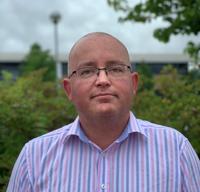
Alexander Roberts obtained a BSc (Hons) in Chemistry from Exeter University, an MSc (with Distinction) in New Materials from the University of Aberdeen, followed by a PhD at the University of Surrey under Prof. Bob Slade in modified clays for de-NOx catalysis. He is currently an Associate Professor within the Future Transport and Cities Institute (Coventry University) and was previously the Principal Engineer on the Battery Scale-up Pilot Line, WMG, University of Warwick. He has significant experience in electrode manufacture for batteries and 30 publications and an h index of 14. He specialises in new materials for energy storage applications and their processing from powder through to pouch and cylindrical cell devices. He interacts closely with international Industrial partners, having worked closely with Maxwell Technologies, ARMOR Group, and Faradion Ltd. and has worked and managed Innovate UK projects with a range of partners including AGM Batteries, Johnson Matthey, Delta Motorsports, and Cummins.
Research Associates
Dr Philip Calado
Phil Calado is a Research Associate in the Department of Physics at Imperial College London. His research involves the simulation and characterisation of charge and ionic transport in perovskite semiconductors, working under the supervision of Dr Piers Barnes and Professor Jenny Nelson. Phil is the lead developer of Driftfusion, a home-brewed drift diffusion simulation tool for modelling solar cells with mixed ionic-electronic conducting absorbers layers.
Dr Fabrizia Foglia
Fabrizia Foglia is a Research Fellow at University College London.
Dr Guanjie He

Guanjie He is a Postdoctoral Research Associate working with Professor Dan Brett and Professor Paul Shearing in the Department of Chemical Engineering, University College London. He received a PhD in Chemistry from UCL under the supervision of Professor Ivan Parkin in 2018. Before this, he obtained a BSc from the College of Materials Science & Engineering, Donghua University, receiving the honour of Shanghai Excellent Graduate. Guanjie’s research focuses on materials for electrochemical energy storage and conversion applications, such as metal-ion batteries, supercapacitors, metal-air batteries, N2 reduction, water splitting, and oxygen reduction in different electrolytes. He was awarded UCL MAPS Research Prize and an STFC Early Career Award.
Dr Pabitra Nayak
Pabrita Nayak is a Postdoctoral Research Assistant in the Department of Physics at the University of Oxford.
Dr Amir Jalalian-Khakshour
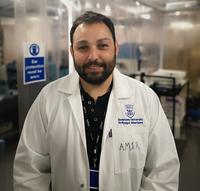
Amir Jalalian-Khakshour is a Technology Transfer Fellow in the SPECIFIC (Sustainable Product Engineerinf Centre for Innovation Functional Industrial Coatings) research centre, at the College of Engineering, Swansea University. Before this he was an Engineering Doctorate (EngD) student working on novel sodium ion battery materials development and characterisation at Swansea University. Amir's research focusses on green processing routes for sodium ion electrode materials and novel electrode manufacturing methods.
Dr Amangeldi Torayev
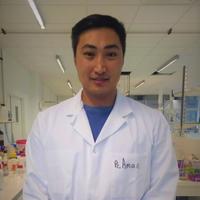
Amangeldi Torayev is a Postdoctoral Research Assistant working with Prof. Charles Monroe in the Department of Engineering Science, University of Oxford. Previously, during his PhD, he studied transport in porous battery electrodes using a combination of computational and experimental techniques under joint supervision of Prof. Clare Grey (University of Cambridge) and Prof. Alejandro Franco (University of Picardie). His current research is focused on electrochemical interfaces in energy storage systems. He aims to expand the fundamental understanding of charge transfer and accumulation on the liquid/solid interfaces in Li-ion and post Li-ion batteries, and their effect on the battery performance.
Dr Marveh Forghani
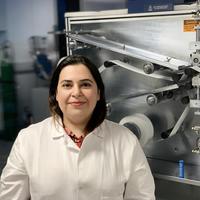
Marveh Forghani is a Research Fellow in Electrochemical Energy Storage Technologies at Coventry University. She completed her PhD in electrochemistry at the University of Newcastle, Australia, working on the development of electrochemical characterisation methods and advanced materials for electrochemical energy storage technologies. This was followed by a Research Asistant position in Direct Carbon Fuel Cell (DCFC) at the University of Newcastle, before joinging the Centre for Advanced Low Carbon Propulsion Systems (C-ALPS), Coventry University in 2019. Her current interests include the development of new high-power systems and the understanding of the effects of pore structure and fundamental properties on prototype devices.



